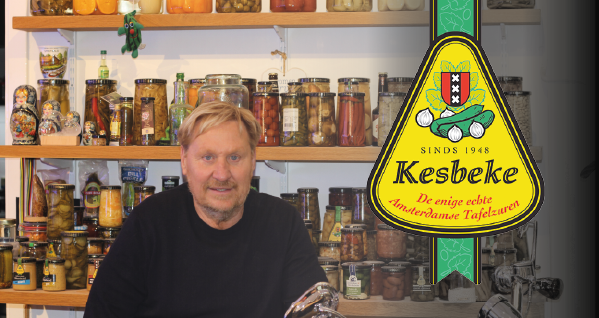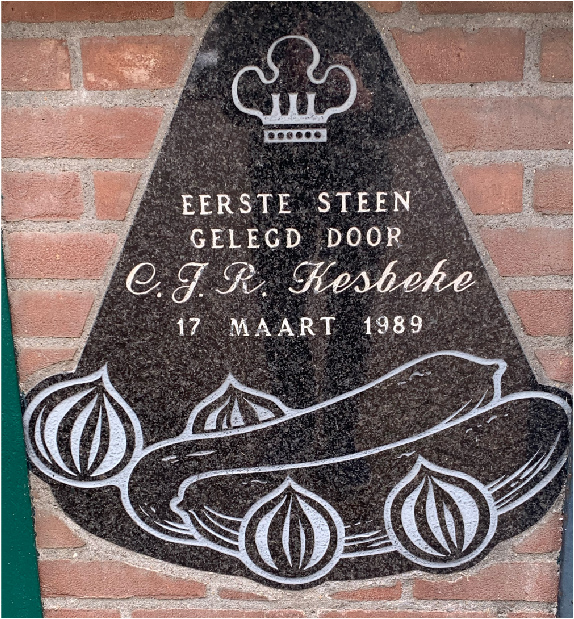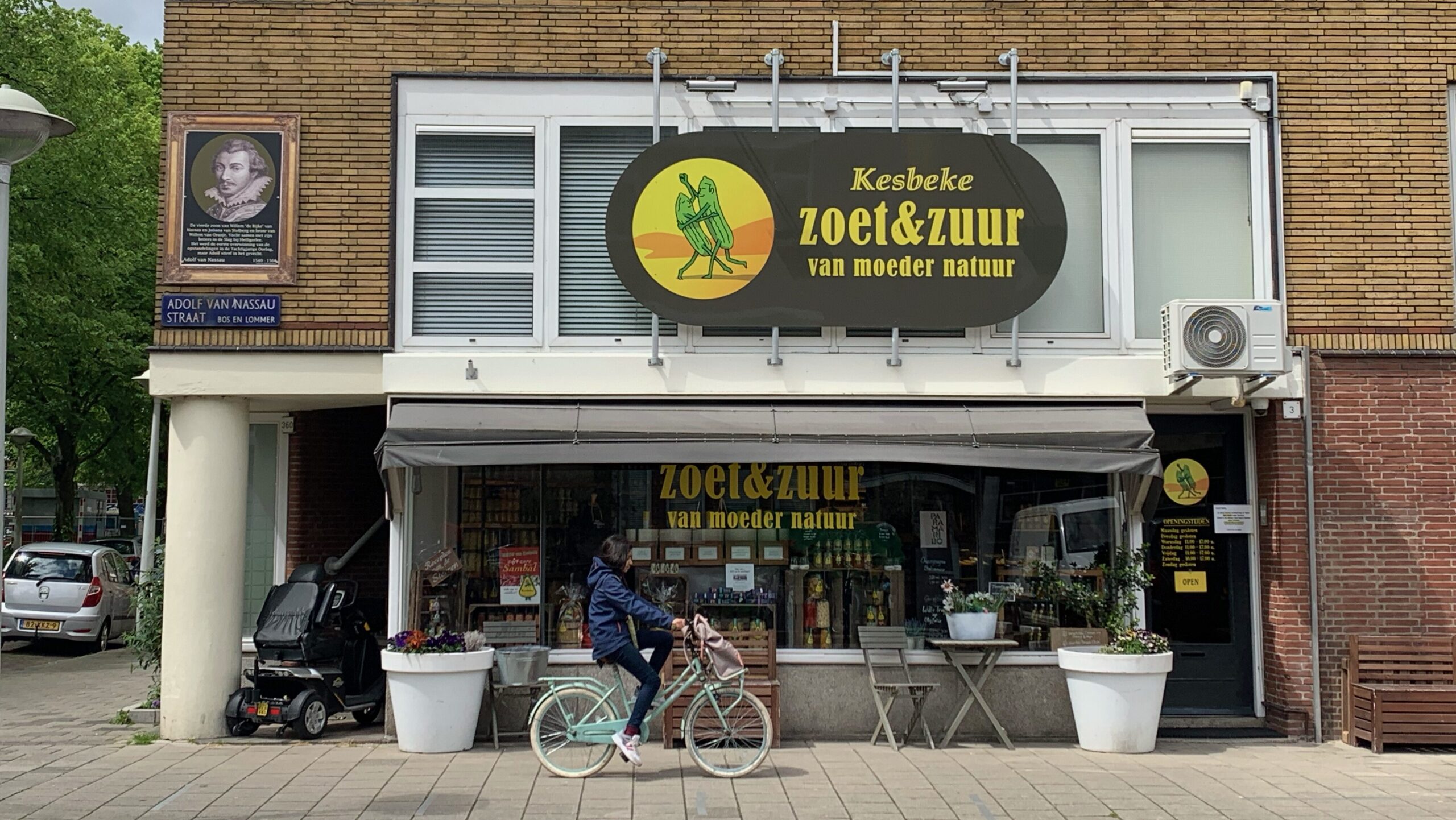
“EVERYONE IS FAMILY WITH US. TOGETHER WE ARE KESBEKE”
This month, Amsterdam Divers & Inclusive (ADI) spoke with Oos Kesbeke about his artisanal family business Kesbeke, known in Amsterdam and beyond since 1948 for its Amsterdam onions, gherkins and other pickles. The pickling of this acid is done at Oos such factory in Amsterdam-West. Under Oos’ leadership, Kesbeke has grown to become Amsterdam’s largest pickling factory, partly due to proper certification and collaboration with top chefs. He talks about what an inclusive workplace means to Kesbeke and how they give substance to the slogan: “Everyone is family with us. Together we are Kesbeke”.
ADI is received in Oos’ office which is full of images of Ajax. What also catches the eye is a painting of Oos together with his father: the second and third generation of Kesbeke. Behind his desk is an aquarium – several metres wide – containing a huge collection of tropical fish. Inside, the office looks as you would expect from a true Amsterdam family business, an Amsterdammer with a big heart for football, motorbikes and Amsterdam pickles. Oos steps inside and we get straight to the point.

Kesbeke has been a true family business since 1948. Is there a difference between a family business and other companies when it comes to staff engagement?
Sure. By combining family and business, employees from outside quickly become part of the big family. That just shines through, nine times out of 10 there is much more commitment and that pays off in atmosphere and quality.
What is the staff composition like at Kesbeke? Is there diversity in e.g. age, male/female ratio and ethnic cultural background?
It varies by section. At Kesbeke, we have production work, office work and warehouse work. Looking at production work, comparatively fewer women are employed. The work can sometimes be physically demanding, not very woman-friendly. But we do have a Croatian lady at the machine there, for example, who has been with us for 15 years. I am proud of that. She will soon reach retirement age and then another woman will leave the battlefield. I sincerely hope to be able to hire someone of her calibre again by then. Furthermore, all nationalities are represented here, which makes us a good reflection of Amsterdam. Also in terms of age: the youngest employee is 18 and the oldest 67. That has not always been the case. I am third-generation Kesbeke and used to work with an older team. I have seen the people and the neighbourhood change and saw that modernisation and rejuvenation were needed. And then you do notice a difference in mentality: the perseverance is sometimes lower in the younger employee. They can copy this mentality from the older employees. In that respect, we have good social control: we all do it together, so you can’t just throw in the towel.
How is the collaboration between all these different people in the workplace?
The cooperation is fantastic. I always say it’s an Amsterdam company: sometimes they totally scold each other and ten minutes later they’re having coffee and it’s never mentioned again. And that is exactly what I want. We are a flat organisation and my door is always open. If you have a problem with something, you come to me and we solve it. That’s kind of how I’m in the game.
Does the diversity among staff also translate into the variety of product offerings? For example, I saw that you are now pickling sour with ras el hanout. How did that idea come about?
With over 300 different products, our range is broad, it varies from a tulip bulb we pickle to a special type of baby food to Kimchi, fermented Chinese cabbage. On the one hand, we have a lot of contact with great chefs and follow food trends to respond to the market. But we also get input from our employees. Recently, I made an employee ‘Kimchi master’, that guy had great, innovative ideas about Kimchi.

Kesbeke helps people with a distance to the labour market find work. How do you approach this?
I think we all have an abnormality. Only in some this comes out a bit more than in others. It makes little difference to me. Sometimes someone deviates from what we are used to, but that certainly doesn’t affect the quality of their work. Also, some need more attention than others, but that applies to everyone. This is not to say that things always work out. Unfortunately, we recently had to say goodbye to two people. Sometimes it doesn’t fit, sometimes people don’t want to. If we give someone a chance and it doesn’t work out, it always feels a bit like losing. There can be many reasons for this: the work is too hard, there is too much going on at home or it simply doesn’t click. Fortunately, 8 out of 10 times it does work out. We often work with a trial period and after six weeks you will know whether there is a match.
In terms of approach, do you have any tips for companies that also want to work on this?
Yes, just do it. Too much is talked about and too little is done. Give people a chance. The moment you do that, you see that all those prejudices are very much less so. Entrepreneurs who employ people with disabilities think ‘man, what did I get myself into?’ Saying ‘no’ is something we should stop doing. It’s also about our children, our future, our people. Who cares if you have to write a report or give feedback once. In addition, my tip is: keep playing with what works and what doesn’t. For instance, we will start next week with broad applications instead of several rounds. We will then start in the canteen, have coffee and have a job interview. Then I bring in the people they will work with and we all sit down together. We explain everything, they can ask anything and get a tour with it. Finally, we gauge whether we can get them over the threshold and they know exactly where they will end up.
Kesbeke is also strongly committed to Corporate Social Responsibility. How do you do this if part of the production chain is abroad?
Well that is very easy. We have a tool through which we get certified. Then you get certified every year and have to do your best to move up the CSR performance ladder. It’s about people, planet and profit, on those factors the company develops , so you get a step higher on the ladder. We are the only inlay factory in Europe with the CSR certificate and I think more companies should start doing this. It is not compulsory, but what I find a bit hypocritical is that companies mention in their marketing statements that they also do CSR and then they have changed three LED bulbs and that’s it.
Do you have a concrete example?
We import a lot of stuff from India and we find it hugely important to be 100% sure that there is no child labour involved. So this has to be clearly checked and certified.
And speaking of the global market. Do you notice anything from the corona?
Sure, our deliveries to the hospitality industry is a big part of our turnover and we don’t supply them much, if at all, now. This saves us 30% turnover. On the other hand, sales in supermarkets have picked up a lot.
But Oos does not want to end there. His afterthought sums up the conversation nicely:
“It is really a misconception that employees with a distance to the labour market are a lot of hassle or take a lot of time. Behind the label ‘distance to the labour market’ are fantastic employees. And without your people you are nothing as an entrepreneur. I think you should also give people who have a harder time a chance. People from all walks of life work here, in terms of origin, background, with or without disabilities. Everyone is welcome here. That also creates a cosy and positive working atmosphere.”
